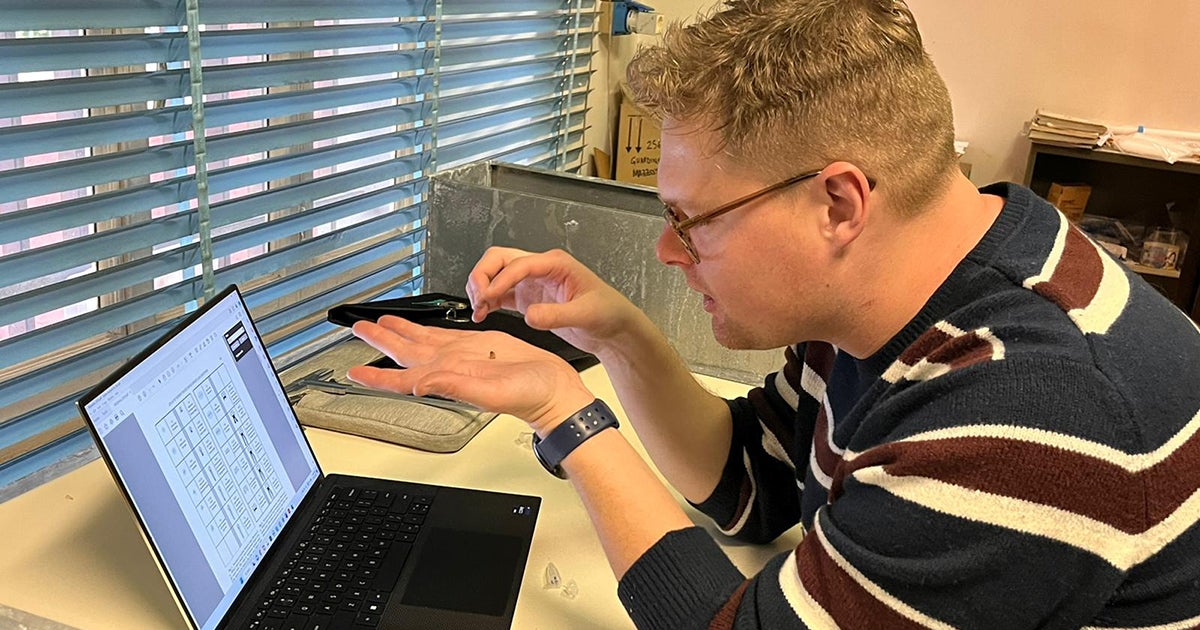Dr. Chris Wolfe, assistant professor of anthropology, also is a consulting forensic anthropologist with the Regional Autopsy Center at ECU’s Brody School of Medicine.
In a collaborative effort to bring closure to a 42-year-old missing persons cold case in Washington, N.C., East Carolina University graduate students and faculty were called upon to support local and state officials and law enforcement in a unique endeavor.
Dr. Christopher Wolfe, assistant professor of anthropology in the Thomas Harriot College of Arts and Sciences, also is a consulting forensic anthropologist with the Regional Autopsy Center (RAC) with the Brody School of Medicine Division of Autopsy and Forensic Services. This means that anything skeletal, or anthropological, may come to Wolfe if a pathologist contacts him for a consultation.
“The RAC at Brody is responsible for all counties here in the eastern part of the state,” he said. “I received a call on Feb. 9 from the investigators regarding a submerged vehicle in Jack’s Creek, with the possibility of human remains.”
Wolfe was asked to assist with the search and recovery. At that time, he spoke with Dr. Charles Ewen, Harriot College Distinguished Professor of anthropology, and mobilized a few graduate students to assist at the site on Feb. 10. Students Liam Cline, Talia Hoffman, Emily Miller and Emilia Rose traveled to the location with Wolfe and Ewen, and participated in hands-on research as they completed a survey of the area and recovered human remains from the drained creek.
“This weekend’s recovery was my first time being able to experience what it was like in the field outside of a classroom environment, and it tested how I would perform under real-world pressure,” said Cline, who wants to continue his education and earn a doctoral degree, and ultimately conduct research and teach in an academic setting.
“While my background is in forensic anthropology, the classroom is very sterile and procedural,” he said. “Being able to work with Dr. Wolfe as my advisor has been amazing and insightful, and having this as my first recovery was extremely challenging. Finding and recovering the remains was difficult, as I had to rely on my hands to do the seeing for me. The entire team worked hard to do what they could in such a short time frame, and being able to provide closure is the most important part of this work.”
Rose is an anthropology graduate student who intends to pursue her doctoral degree in biological anthropology after receiving her master’s degree in the spring.
ECU anthropology graduate students Talia Hoffman and Emilia Rose, foreground, Dr. Chris Wolfe, back left, and two law enforcement officials search for human remains along a drained creek bed in Washington, N.C.
A vehicle, presumed to be from a missing persons cold case from 1982, was found in Jack’s Creek in Washington, N.C. (Contributed photos)
“Watching the community come together to support these families was the most incredible thing I have seen,” she said. “Every person there was entirely dedicated to the cause, doing everything they could to provide closure to these families. While the recovery process was intense work, being able to provide families with some answers made it all worth it.”
All recovered remains are now under the custody of the RAC, and Wolfe will work with them over the coming weeks to provide analysis for a report. Remnants of the car were pulled from the creek and are under the custody of Washington, N.C. and Beaufort County law enforcement.
Analyses will be ongoing. Wolfe said it may take months for the DNA to come back from the North Carolina State Crime Lab, and he said given the environment (submerged underwater), it may be difficult to get intact DNA from the remains.
“My analysis will supplement the report of the forensic pathologist,” he said. “The team at Brody will send away for DNA and as a result, my report, the pathologist’s report and the DNA report will hopefully lead to possible identifications.”
